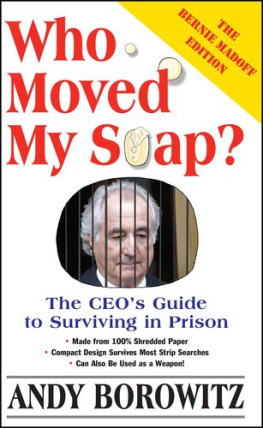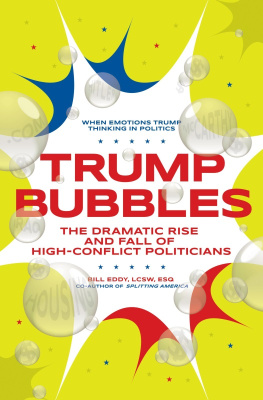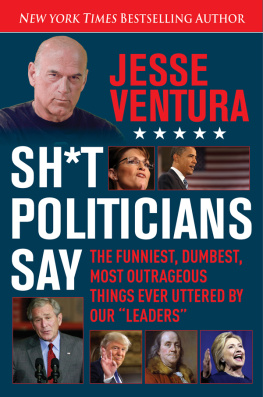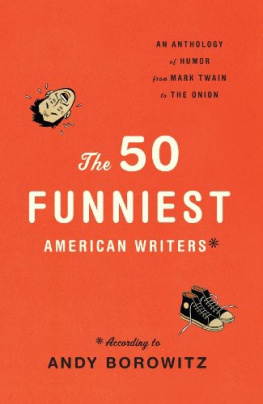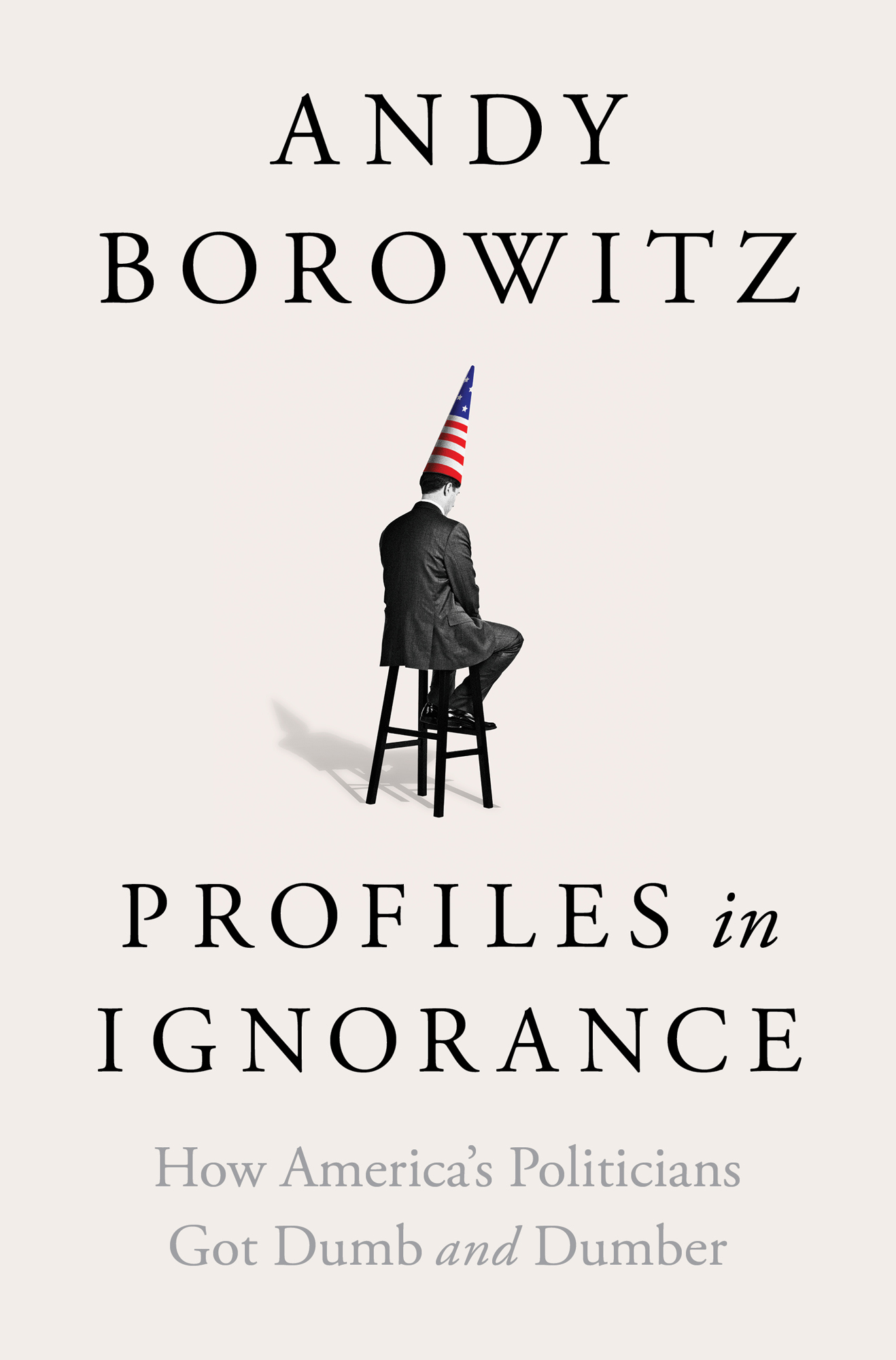Contents
Guide
Andy Borowitz
Profiles in Ignorance
How Americas Politicians Got Dumb and Dumber
To my family, with all my love:
Livy,
Lexi, Max, Maddie,
and Niko
Being dumbs just about the worst thing there is when it comes to holding high office.
HARRY S. TRUMAN
The worst thing a man can do is go bald.
DONALD J. TRUMP
Introduction THE THREE STAGES OF IGNORANCE
I magine a hypothetical job applicant. He cant spell the simplest words, such as heal and tap. Confused by geography, he thinks theres an African country called Nambia. As for American history, hes under the impression that Andrew Jackson, who died in 1845, was angry about the Civil War, and that Frederick Douglass, who died in 1895, is still alive.
Given the alarming state of his knowledge, you might wonder what job he could get. Unfortunately, hes not hypothetical, and the job he got, in 2016, was president of the United States.
People sometimes call our nation the American experiment. Recently, though, weve been lab rats in another, perverse American experiment, seemingly designed to answer this question: Whos the most ignorant person the United States is willing to elect?
Over the past fifty years, what some of our most prominent politicians didnt know could fill a book. This is that book.
This book will also examine what brought our country to such a stupid place. Well retrace the steps of the vacuous pioneers who turned ignorance from a liability into a virtue. By relentlessly lowering the bar, they made it possible for todays politicians to wear their dunce caps with pride. Gone are the days when leaders had to hide how much they didnt know. Now cluelessness is an electoral asset and smart politicians must play dumb, or risk voters wrath. Welcome to the survival of the dimmest.
Maybe youre thinking, So what? Weve always had dumb politicians. Thats undeniably true; as the political satirist Will Rogers said, Its easy being a humorist when youve got the whole government working for you. When I was growing up in Cleveland, Ohio, I struggled to find a politician I could take seriously. In 1972, our mayor, Ralph J. Perk (his actual name), presided over a trade expo for the American Society for Metals. There was a metals-themed opening ceremony, requiring the mayor to cut a titanium ribbon with a welding torch. As Perk held the fire-spewing tool, sparks flew skyward and set his hair ablaze. The incident, which, thankfully, is available on YouTube, inspired mocking headlines around the world. It also reinforced Clevelands unfortunate reputation for flammability: three years earlier, our polluted Cuyahoga River had spontaneously combusted.
Perhaps the hair-on-fire incident was Ralph J. Perks version of the Icarus myth, a cautionary tale about what happens when a politician flies too close to a welding torch. Like Icarus, Perk came crashing to Earth. In 1974, Ohios voters rejected his bid for the U.S. Senate and chose someone less likely to be flummoxed by technology: the astronaut John Glenn. Perk received hair transplants at the Cleveland Clinic in 1976 to repair the bald spot the torch had created, but by then his political career had been singed beyond repair. He did have one other notable achievement as mayor: Richard Eberling, a man he hired in 1973 to redecorate Clevelands city hall, was later convicted of homicide and linked to another murderthe one that inspired the TV series and movie The Fugitive. Perks historic role as a job creator for suspected serial killers hasnt gotten the attention it deserves. I hope Ive fixed that.
Perks political career collapsed in 1977 with a humiliating third-place finish in Clevelands nonpartisan mayoral primary, a result I found reassuring. I believed his downfall proved democracy had a braking system. If a politician was too big a doofus, the brakes would keep us from hurtling off a cliff. But on Election Night 2016, it felt like the brakes were shot.
As the Trump nightmare unfolded, well-meaning people tried to soothe a rattled nation by arguing that he was no dumber than some of our previous dumb presidents. In this valiant attempt to pretend the hellscape enveloping us was nothing new, they cited a bygone commander in chief reputed to be one of our densest: Warren G. Harding. Its true that our twenty-ninth president would never have been put in charge of designing the next generation of supercolliders. After Hardings inaugural address in 1921, H. L. Mencken wrote, No other such complete and dreadful nitwit is to be found in the pages of American history. Mencken shouldve added, so far.
People have pilloried Hardings campaign slogan, A Return to Normalcy, for which he allegedly coined the word normalcy when a perfectly good actual word, normality, already existed. But, according to Merriam-Webster, normalcy first appeared a decade before Harding was born, in a mathematical dictionary published in 1855. Now, its true that Harding did our language no favors by popularizing normalcy, a word almost as annoying as impactful, but he was a slacker compared to Trump, whose mutilation of English could fill a non-word-a-day calendar. Out of fairness, Ill exclude from discussion the much-mocked covfefe, which was probably just a late-night typo, and draw your attention to remarks he made at the Pentagon in 2019, when he seemed to invent a new military term, infantroopen. Based on my research, there are no prior appearances of infantroopen in any dictionary, mathematical or otherwise.
Of course, Hardings bad reputation stems from more than one iffy word. His presidency birthed a profusion of controversies, most notoriously the Teapot Dome corruption scandal, long considered second only to Watergate in its infamy. (Proof that Watergate was worse: dome never became a suffix.) But how much blame Harding should shoulder for Teapot Dome has been debated. In 2004, Watergate celeb John Dean published a biography in which he argued that Harding had done nothing wrong and had not been involved in any criminal activities. Whether you agree with that verdict or not, its hard to get too worked up over Teapot Dome once youve seen a president urge a mob wearing fur pelts and face paint to storm the Capitol.
When you review some of Hardings presidential initiatives, comparisons to Trump seem even less apt. Harding supported a federal anti-lynching law and proposed a commission to investigate not only lynching but the disenfranchisement of Black voters. On October 26, 1921, he advocated racial equality in a major civil rights speech in Birmingham, Alabama. Whether you like it or not, our democracy is a lie unless you stand for that equality, he declared. For a guy Mencken called a nitwit, he was far more enlightened than the person who, in the aftermath of the deadly Unite the Right rally in Charlottesville, said that there were very fine people on both sides. (Its also possible that Mencken didnt think ones support for racial equality was desirable, since his posthumously published diary revealed him to be racist, anti-Semitic, and pro-Nazi. In other words, a very fine person.)
One quality Harding and Trump have in common: neither excelled at monogamy. But, even here, Harding wins. In 2014, the Library of Congress released letters he wrote to his lover, Carrie Fulton Phillips, containing florid passages such as this: I love you more than all the world and have no hope of reward on earth or hereafter so precious as that in your dear arms, in your thrilling lips, in your matchless breasts, in your incomparable embrace. Its hard to imagine Trump writing something so heartfelt to Stormy Daniels, or a sentence that long.

